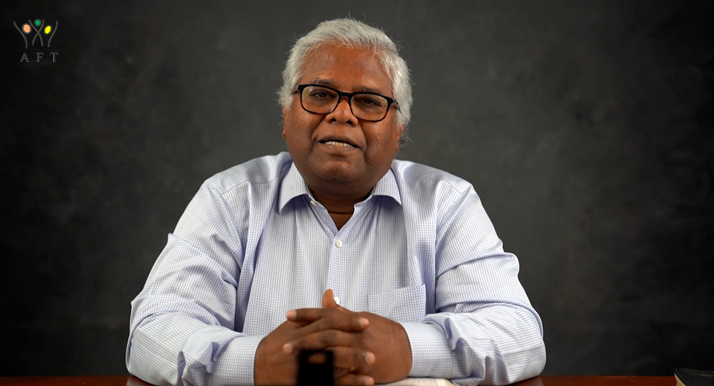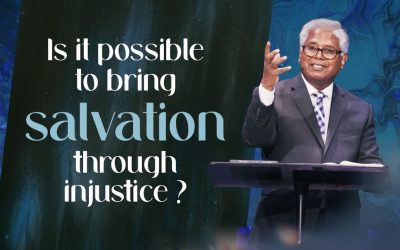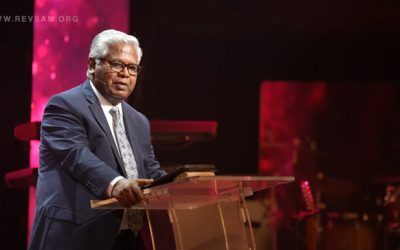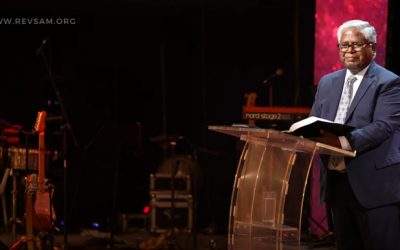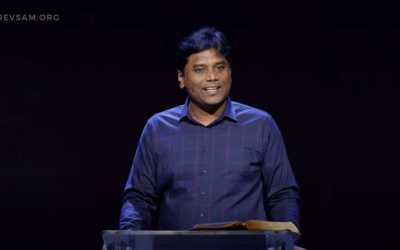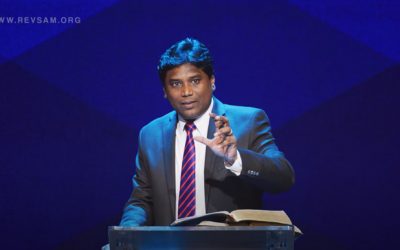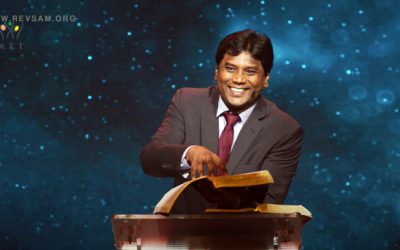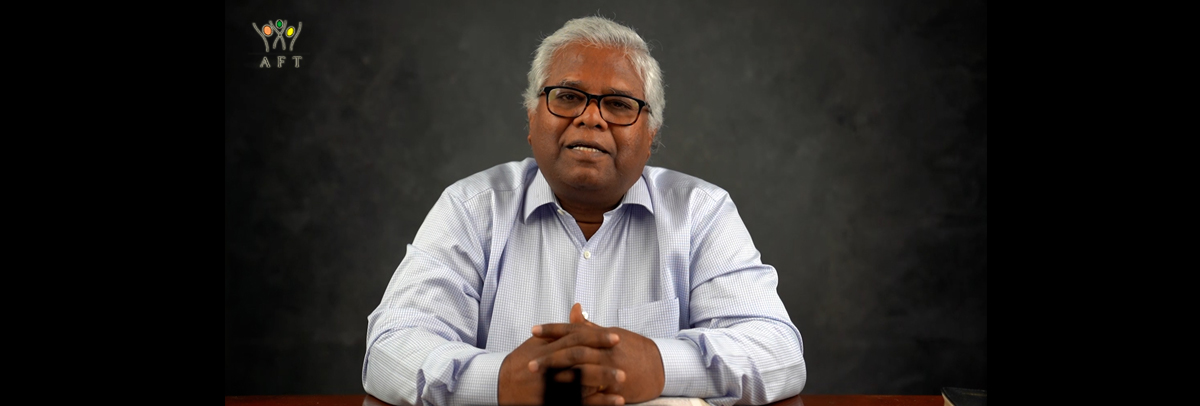
Abounding Grace (Vol 32) – Lostness
Sunday English Service – 07 FEB 21
Transcript
We’ve been doing a series of teachings on grace and we titled this teaching as “Abounding Grace”. The Apostle Paul says, “Where sin abounded, grace did much more abound”. What he means is, sin comes into people’s lives, totally dominates and destroys everything in their lives but when the grace of God comes in, through salvation, it rebuilds their lives and makes everything beautiful and wonderful, even better than before. And so, this is a teaching about how the grace of God changes people’s lives.
Now, in this teaching, we went to a lot of places and finally came to Luke, chapter 15. In Luke, chapter 15, I’ve been showing you that Jesus is speaking to religious leaders – the teachers of the law, the Jewish religious leaders – who look at him being friendly with the sinners. Those days when they said sinners, it refers to prostitutes and such people, and even tax collectors and so on. And they call them sinners and they kept them as outcasts in society but Jesus was very friendly with them. They came near to Jesus, to hear Him. So, the Pharisees and scribes are also there in the meeting, and they were murmuring about this. They were basically murmuring saying, “Why are you hanging out with these lost people? Don’t you know, they are lost? Don’t you know, they have nothing to do with God? Don’t you know, they are alienated from God; ? They are far away from God; you stay far away from them also. We stay far away from them; they are outcasts. Why do you get close to them? Why are you so friendly with them? You seem to get along with the sinners too much. They don’t come to our meetings; why are they coming to your meeting? That means there is something wrong with your teaching. They love your teaching because your teaching accommodates sinners”. That the way they were mumbling, I think.
And Jesus in response to their murmuring gives these three parables in Luke, chapter 15, and they are all about ‘lostness’, because they are saying that these people are lost people; that means they are alienated from God, they’re far away from God. They have nothing to do with God; God has nothing to do with them. Why are you bringing them in here? Jesus tells them, three parables of lostness. The first parable is the Parable of the Lost Sheep; the second parable is the Parable of the Lost Coin and the third, is the Parable of the Lost Son. Now what is Jesus trying to say in these parables, particularly the Parable of the Prodigal Son, which we’ve been dealing with for the last several weeks, really? Jesus is trying to get across a new idea, a better idea, than what the Pharisees had, about what it means to be spiritually lost. In the climax of these three stories, when it particularly comes to the story of the prodigal son, when it comes to the very climax of it. There is the story about the older son and there we have the most amazing, shocking, tradition-busting message of Jesus, about what it means to be spiritually lost. It’ll shatter all our beliefs, concerning what it means to be spiritually lost. That’s why we need to go into this today. I think all the people that were listening to Jesus, particularly the Pharisees and the scribes, who were religious leaders and teachers of the law, would have been astonished and astounded on that day, when Jesus taught; they would have been shocked. And I want you to see today, certain truths about this ‘lostness’ that Jesus talks about; this new idea of ‘lostness’ that He brings in, through this story. So, we’re going to talk about four things. What is this new understanding of lostness that Jesus is talking about? Secondly, how can you judge whether you are lost in that way? You and I, whether we are lost in that way. You can say it in another way: what are the signs of that kind of lostness? Thirdly, what do you do, if you found that you are in that kind of lostness or lost condition? What do you do to set it right, if you find yourself in that lost condition? Fourthly, what are some of the implications of the truth? For us, as the church and our life together in this world. So, four things.
Let me look at the first thing. What is this new understanding that Jesus brings about lostness? See, Jesus being a brilliant storyteller, is showing us through the story, that both the older and the younger son, are lost. Now, anybody looking at this story, hearing this story, will immediately identify, that the younger son is lost. That’s no problem. Because we have this paradigm in our mind, lostness means this kind of a thing: this boy, taking all his father’s money. That’s wrong. While his father was alive, asking for his share, walking away from his home, going to a distant country, living his own life, especially wasting his money, running after prostitutes; we say, “Yeah, that’s lostness – yeah, that’s lostness”. We immediately know, that lostness. But when we look at the older brother, who stays at home, works faithfully, and so on. We say, “No, no, no, he’s not lost”. This is where the shattering message, really shatters all our beliefs, and all our misconception about what it means to be lost.
Jesus, in this brilliant story, is telling us, that both the younger son and the older son are lost. Remember, the younger soon? He took his father’s wealth, went and wasted it, living and running after prostitutes and doing such things. He’d lost everything. He wanted the father’s things. He was after the father’s things; he didn’t want the father. He hated the father, it looks like. He wanted to get away from the father; go far away from the father. He wanted only the things that the father could give him. So, he took it quickly, rushed out and went far away, so he could live his own life. So, that’s the way the younger son did it and you can see that he is lost, but look at the elder brother. Is he different from the younger son? On the outset, it looks like he’s a whole lot different from the younger son. No, he’s only superficially different from the younger son. Basically, he’s not different at all. Why do I say that? Because when the younger son comes and the father welcomes him with a kiss, puts on a best robe, puts on a ring – the signet ring on his fingers – and gets him the sandal and restores him back into the position of a son. The father, if you asked him, he’ll say, that’s the greatest day of his life because he thought his son was gone and gone forever, lost forever. He says it like that. He says, “My son was dead”. “That means I thought he’ll never come back; I thought I’ll never see him again. Finished. But now, he is alive again. He’s lost and is found”, he says. That’s the greatest day in the father’s life. And so, he arranged the greatest feast that he has ever given because the son was back. The son he thought he lost, was back. The elder brother knew that this was the greatest day in his father’s life. Yet he didn’t care. You think he didn’t know that it was the greatest day, that his father was very happy? The father that had two sons, lost one son, just imagine how he would have felt – so happy that the boy came back; receives him with a hug and a kiss and all of that; arranges a big feast, kills the fattened calf but the oldest son will not come in; stands outside and argues with the father, fighting with the father. He won’t go in. He humiliates him and argues with him.
So, what does the elder brother care about? What is this thing with the elder brother? Why is he angry? What bothered him the most? What bothered him the most was, that the father’s things were involved. He was also after the father’s things. Now he’s seeing that the father’s things are being given to the younger son; that this guy has come back after wasting all the money – his share – has now come back, to share in the father’s wealth, which all belongs to the older son now. That’s the thing. It’s a ‘things’ issue. He’s all upset because a fattened calf has been killed. Those days, meat was not a normal dish, at that time, in that place. It was a delicacy. A fattened calf was an extremely valuable, pricey, and costly way to hold a feast. It would have been the most expensive, lavish feast that the father could possibly throw. And he’s throwing it, and probably invited the whole village or whole town and the oldest son is thinking, why couldn’t we just have a couple of samosas and a tea? Why couldn’t it not be a pizza and a coke? Why a fattened calf? My God! One of my fattened calf is being killed for that! He’s all upset at the father, bringing the best robe and putting it on him; giving him the signet ring that belongs to the family; and putting on the sandals for him. He is upset that the father’s things are going, one by one, now. He doesn’t care a bit about the father. He is right there; he seems to obey the father. He seems to work for the father. He does all those things but he does not care about what’s going on in the father’s heart. He does not appreciate the love that the father has.
So, this means that we have two sons here, who are lost. One of them looks very, very bad. He has broken the father’s rules. He has wasted the family fortune. He has run off and squandered all the money, among the prostitutes. But the other son, is a very, very good son, who’s out to the field; he’s working hard. He obeys the father. He’s very religious, he’s very spiritual, he obeys the 10 Commandments, he prays, he reads the Bible. What more do you want? The problem is, he’s also after the father’s things; they both want to really control the father’s things and both of them, don’t really love the father. That’s the problem. The father, therefore, had to go out to each one, to the younger son first, and then to the elder son, to receive them. Remember, when the younger son came in? The father had to go after the younger son, and receive him with a hug and a kiss and say welcome, come in and throws a big feast. He rejoices over his son’s return, makes him feel absolutely welcome. He must have come back thinking, whether the father would accept him or not but now he knows for sure, that the father wants him back. What a welcome; what a reception.
Once the feasting starts, the elder son comes around, and he does not want to enter in. Now he’s got to – the father has to go out and plead with elder son, this obedient, elder son, this good elder, who does not want to come in. He has to welcome him. He wants to make him feel at home, he wants to make him feel loved. He says, “Come on in. Rejoice with me. Come on in. Your brother has come!” So, look at how he goes out to the elder son and how he talks to the eldest son. He says, “My son”. The Greek word there is ‘téknon’, which means ‘my child’. It’s a very tender word that is used. He is not very furious with him, he is not angry with him, though he should be. He goes out and says to the older son, “My child, you have always been with me”. What a language he uses: “My child, you’ve always been with me”. Isn’t that amazing? Another way of saying, “I appreciate all your hard work, I appreciate your sincerity, your loyalty, being a good boy”. So, he’s being very sweet and very tender. He’s going out and saying, “Come on in. Get rid of your anger. Come in, celebrate with us”.
What Jesus is trying to show in the story, is that both the bad son and the good son, are both lost. That’s the new idea of lostness. They both are cut out from the father; they both are trying only to control the father’s things. They don’t want to love the father. They don’t love the father. They have no love for the father. So, they’re both lost. One, is lost by going away. The other, is lost by staying in. One of them, is trying to get control of the father’s things, by going off and breaking all the rules, and the other, is trying to get control of the father’s things by staying at home, and obeying all the rules. What a tremendous revelation here. Both are lost – one goes off and breaks all the rules and live riotously; the other stays home and keeps the rules and lives obediently. Both are lost!
So, Jesus is saying they’re both alienated from the Father. They both are lost, but the most amazing thing about this whole story, is that He ends the story this way. He ends the story with the younger brother, repenting, humbling himself, coming into the family back again, and being accepted by the father and brought into the home, into the family. The older brother remains lost. The younger brother is saved, brought back into the family; the older brother in the story, remains lost in the end, the story ends like that. Well, how do you know the story ends like that? Maybe afterwards, the older boy came in. But you have to remember, this is not a historical account of something that happened. This is not an event that happened, somewhere. This is not a real story. This is a made-up story, to reveal a truth. So, when the story, the matter ended. You can’t say, well, he might have come in next day or he might have come in, later on, a little bit later. He may have regretted and come in. No. When the story ends, it ends by the father saying, “It was right that we should make merry and be glad, for your brother was dead, and is alive again, and was lost and is found”. It doesn’t say anything about the older boy coming in. He leaves it at that. The older boy still remains lost; the younger one who was lost, has now been found. He has come in, become part of the family. So, Jesus is making a point, that the bad kid is saved and the good kid is lost. And look carefully, the elder son is not lost despite his goodness; he is lost because of his goodness. I mentioned that a couple of times in the past few weeks. Look why he is angry, why the older brother is angry. Why he’s staying outside, why he’s furious with the father. He says that, he says that in verse 29. He says, “I have been serving you; I never transgressed your commandment, at any time”. “I’ve never disobeyed you”, that’s what he’s saying. “Never disobeyed you”. So, because of his goodness only, he’s lost; not despite of his goodness. It’s not like he was good, but he was lost. No, no, no, because of his goodness, the goodness was the cause of his lostness. Because his goodness made him think like this. He said, “Because I was good, because I’ve been working so hard, because I’ve been so sincere and I’ve been so good and I’ve been doing things right, you should do things my way. And you have not done things right, you have not done things my way”, he tells the father. “Therefore, I won’t come in”. The younger son was alienated from the father, by his wrongdoing; the oldest son is alienated from the father, through his right doing. Plus, the pride in his right doing, that’s the thing. Therefore, Jesus says, there are two ways to be spiritually lost: one by being very bad; and the other, is by being very good – two ways, to be spiritually lost. You can be lost, by being very bad; you can be lost, by being very good. That’s a startling thing. This is why I say that this is a truth, that shatters all our paradigms, that we have set in our mind.
Now, how can it be that you can be lost, by being very good? You can be lost, by being very good because the Bible says that you can look to Jesus as your Savior, or to something else, to save you and to justify yourself. You see, this is all about salvation. You can look to Jesus to be your Savior and Lord, or you can look to something else, to justify yourself, to provide the meaning and significance for your life. Do you remember, the great movie called, “Chariots of Fire”? It’s about British athletes, competing in the Olympic Games. There in the movie, there is a character, an athlete, called Harold Abrahams. And Harold Abrahams talks about why he is under such pressure to achieve and to win the gold medal and this is what he has to say. At one point, he says, “When that gun goes off, I have 10 lonely seconds to justify my whole existence”. Just 10 seconds, in which he’s going to run, justifies his whole existence. That’s the meaning of life. Amazing. What does he mean? He’s not saying something that is very strange to us; we all say that in a way. We all have many ways of justifying ourselves. So, you say, for example, ‘I’ve been a good mother; I’ve been a good father; I’ve been a good child. I worked very hard and I’ve succeeded in so many ways and I’ve done this. I’ve gone through a hard road, and all of that’. We all have ways and find ways, to justify ourselves, to prove our righteousness, to prove that we are right, to prove that we are worthy, to prove that we have some significance. So, everybody looks to something, so that they can say, “My life is justified; I have value. My life is worth something. I have a certain amount of significance”. Everybody looks to something. The Bible says, you can either look to Jesus to be your salvation, or to be your justifier. Or you can look to something else, like, Harold Abrahams was looking at, to be your salvation. He was looking at his 10 seconds of his run. That’s the thing that is going to justify his existence, he says. Here the elder brother has got something to justify himself. You know what that is? His good works; his goodness. He thinks he can be his own Savior and Lord. He’s not looking for a Savior and Lord. He thinks he’s so good, he doesn’t need a Savior and Lord.
See, there are two ways to be your own Savior and Lord. One is, by doing what the younger son did. He said, “I’ll live my own life; I’ll be my own Lord. Don’t tell me what I should do and what I cannot do; I will decide that. I will live the way I want to live”. So, he went far away and did that. He was his own Savior and Lord. What a mess he made. The other way, to be your own Savior and Lord, is by being very good, is by saying, “Well, I don’t need anybody to save me or anybody to show me any mercy or grace or anything like that. Look, I’m good enough. I work so hard, I obeyed; I never disobeyed. I obeyed the 10 Commandments, I’ve prayed, I serve Jesus. And I’ve tried hard to be like Jesus. And I try my best to live this Christian life. Therefore, God owes me, to answer my prayer. He owes it to me to give me a good life, and take me to Heaven when I die, because I’ve been so good. Oh, how perfect I’ve been”. So, two ways to be your own Savior and Lord. Now, if you’re thinking like this older brother, then Jesus is your moral, He’s your example, He may even be your boss but He is not your Savior and Lord. So, you can be your Savior and Lord, by two ways: one, by breaking all moral rules and going and living a riotous life, or by keeping all moral rules and saying,” Because I kept it, you owe me”. That’s enough credits, that you owe me my salvation, you owe me my Heaven, and so on.
So, Jesus ends the story with the younger brother, the bad boy, being saved. And the good boy, remaining lost. By doing that, He’s not saying that the younger boy was right in what he did; that he asked for his wealth from the father, that he went away to a foreign country, and lived riotously, spent all his money on prostitutes, and all that. Jesus is not saying that boy was right. He’s not saying that’s why he’s saved. No. What He was saying, is that the younger brother at least makes you know, that he’s lost. You can actually see him and know that he’s lost; that he’s got a problem. When you see him, you know that when you do something like that, you’re lost; you’re in trouble. But the trouble with the older brother is, that if you’re like him, you’ll never know, that you’re lost. It’s difficult to know that you’re lost. Therefore, it is more spiritually dangerous to be in a situation like that, to be like the elder brother, because you probably will not notice and will not know, that you’re lost. That’s what Jesus is trying to say. The ‘younger brother lostness’, is very easy to identify. Everybody knows what it looks like. He finds himself in the pigsty and wakes up with a hangover, and has nothing to eat, totally gone to waste, reduced to nothing. Everyone can see that he’s lost and he himself can see. He came to his senses, the Bible says, Jesus says. What are the signs of the ‘elder brother lostness’? That’s the problem. He doesn’t have any bad signs like that. He’s in the church, he’s praying, he’s in all the fasting prayer meetings, he’s serving Jesus. So, how do you know if you have ‘elder brother lostness’? It’s a problem.
So, let’s go to the second thing. How can you judge whether if we are in that category – you and I – if we are in that category, if we are lost in that kind of way, how do we know that? Actually, this text itself gives you three kinds of signs. The first one, is that the elder brothers have an undercurrent of frustration and anger, throughout their lives. Look at this boy, he says, “I’ve never disobeyed you; I’ve slaved for you”. That’s the way he says. “I slaved for you; I never disobeyed you, yet, you never gave me anything”. Frustration. Have you seen Christian people like that? They’re frustrated. They look at the young fellows that come in nowadays; the new ones that just come in and receive Jesus as Lord and just come and they are so changed and so transformed and all of a sudden, they’re so mightily used and powerfully able to do things. They look at them, they’re frustrated, they’re angry inside. You will find some of these elder brother types always criticizing them. They don’t like them; they don’t like anything that they do. Because the simple reason is, they say, “We know what he was like. How can this fellow preach now? How can he start preaching, all of a sudden? Do you know how many years I’ve been there? Do you know how hard I worked? Do you know how much I’ve suffered? Do you know what all I’ve gone through? What has he gone through? If you haven’t gone through any suffering, you’re not fit for ministry. I’ve gone through so much suffering and I’ve been so good. I’ve gone through only suffering and look at you! You came yesterday and you’re so blessed! How come? I can’t accept that. There is something wrong with you. Have you seen that kind of elder brothers?
That’s the problem with this guy. He’s saying, this son of yours who went and ran after prostitutes and spent all your money and wasted your wealth, is wasted there, and he has come back and you give him a fattened calf. How come you bless him so much? How come you’re not blessing me in any way? You haven’t given me even a little goat to celebrate with my friends. You’ve given him a fattened calf. The father says, “You’ve been with me, everything is yours. You can kill a fattened calf anytime you want. You can have anything you want. It’s all yours. This boy is lost and is found this boy was dead, and he’s come back, alive. We have to be glad; we have to be happy, understand that!” Have you seen, frustrated, angry, elder brothers? When you see people always talking about others, nowadays, all this social media and all this has come up. And people use such language – Christians, I’m talking about – use such language to talk about others. “Ah, he’s a fraud and we know what he’s like”. And, you know, judgmental? Talking nonsense about others, de-meaningly, putting down others, using words that even an unconverted person will not use, talking like that. That’s an ‘elder brother’, my friend. That’s the ‘elder brother’ spirit. That is pent up anger and frustration inside. That this guy is doing so well, he has come newly, he is but junior and he’s coming and doing so much and everything is going so great. God is anointing him and blessing him and prospering him and so on. But here I am, I’ve done it for 60 years and, 50 years and nothing is working for me. And I am going from worse to worse. What is this? That kind of frustration, frustration and anger. Have you seen that? I’ve seen that a lot.
I want to tell you something. In God’s kingdom, it’s a ‘grace economy’ and if you don’t watch out, you’ll end up like this older brother and what he says, in verse, 28 and 29. “He was angry and would not go in”. And he says, “I’ve been slaving for you; I’ve never disobeyed your commandments and you gave me nothing”. It’s that frustration, you will have, all the time, if you don’t watch out because this is ‘grace economy’ – God chooses. Sometimes, the people that you think are not worthy, that you don’t want to even respect in any way but God will choose. God will honor, God will bless, God will prosper and God will use. What are you going to do about it? Are you not good at coming to the party? Are you going to stand outside and criticize? Are you going to have such a bad spirit about it? Come on, my friend. That’s one of the signs of being an older brother. They’re just mad, hostile, angry. There is an undercurrent of frustration and anger.
Secondly, another mark of ‘elder brother lostness’, is that everything that they do for God, their whole spiritual life, is a duty. There is no beauty in it, there is only a duty. Look at what it says in verse 28 and 28. Verse 28 and 29 are very important. Look at what the elder brother says. He says, “All these years”. New International Version (NIV) says, “All these years I’ve been slaving for you”. That’s interesting. There’s an irony here. Did you notice that? The younger boy, who wasted his life among prostitutes and came in. He knows that he cannot expect to be received as a son because he already wasted all his wealth; exhausted everything and is coming back. Humbled by grace, he has to be admitted and if they take him even as a servant, he is happy. So, he comes and he wants to say to his father, “Please take me in as a servant; I’m not worth to be called your son”. But the father takes him as the son, puts on the robe, puts on the sandal, puts on the ring; everything is a sign of a son, not a servant. He makes him the son again.
Here’s another boy who thinks he’s a son and yet, because of the spiritually lost condition, he is actually a slave; he’s got a slave mentality. He says, “I’ve been slaving for you”. Do you know how many Christians are like that? They’re fighting with God every day. They say, “Lord I’ve been slaving for you; how hard I work for you, how much I suffered for you. Why haven’t you done me good?” It’s all been a drudgery, it’s been a grind, that’s the way they see this service for God. They’re always talking in terms of how they suffered, how much they suffered, that’s all they’re talking about. See, the elder brothers, they obey, they pray and do all those things. They do the right things but the thing is, it’s all a grind, it’s all a drudgery. It’s all duty. There is no joy in it at all. The elder brothers find God useful. In other words, they like to use God. Have you seen people that want to use God? When they need something, they’ll come to God. So, when the elder brother prays, he brings a big list of prayer requests. He wants this and that, he wants to ask everything. It’s all the time, only requests, only petitions. Every time he comes to God, he’s got a big list. But there is no adoration of God, in their prayer, there is no worship. There is no delighting in God. There is no rejoicing in God. There is no thanksgiving; those elements are missing from prayer. There is no enjoyment of God. But there is only asking for this and that and everything, because they find God useful.
But a true Christian, a Christian who has tasted the grace of God, who’s saved by grace and knows that he lives in a ‘grace economy’ and everything works by grace; he finds God beautiful. He enjoys God. He prays, he reads the Bible, he serves God, he does things in the right way. Why? Because he delights in it. He loves God; he delights in it. So, what does it mean to find something beautiful? It means, that you do everything that you do, in your spiritual life, with a great joy. You’re not having some ulterior motive. You’re not saying, “Well, I’m going to pray from today, every day, two hours a day and let’s see what happens. Let’s see what God gives”. No, it’s not like that. He says, “I’m going to pray more because I enjoy that prayer time. I enjoy spending that time with God. I enjoy and delight in it. It’s such a wonderful, pleasurable time to enter into God’s presence and pray and worship God, sing to God and give thanksgiving to God. It’s a wonderful thing. So, I want to spend more time; this is not enough. What I’m doing is not enough. I want to spend more time; I want to get away more and do it somewhere alone. I want to give more time to it”. See, he’s different. But the other guy is saying, “Well, I’ve prayed two hours, so, what are you going to give me, God”. That kind of thing. He finds God useful, but the true Christian finds God beautiful. That’s the difference. So, prayer is a duty for an elder brother but prayer is beautiful, for a grace Christian. He enjoys it; he delights in God. The older brother says, “Well I’ve always been obeying; I’ve always done what You told me, but my life isn’t getting any better. How come You bless that guy? He came today. Look, I know what kind of background he comes from – he’s so bad! Don’t you know, God, where he was or what he did and how he was like, and here he is rising to the top?” That’s the way the elder brother thinks. He thinks, I’m not getting anything out of it but I’ve been obeying and obeying and obeying, so sincerely obeying and I’m not getting anything out of it. There is this frustration inside.
But a Christian, who understands that he’s saved, only by grace, thinks about it like this. He thinks about Jesus and how things were with Jesus. Jesus was completely faithful to God. He was completely faithful to us. He was completely obedient and faithful to His calling. Jesus came to die; His body was given so that He could hang on a Cross and die and shed His blood and give His life. That’s why He came. So, He died a horrible death on the Cross. And for everyone, everything seemed like it went wrong in His life, because He was so faithful and obedient. They looked at him and said, “Look at him. He was so faithful; He was so good. He never sinned, He never did anything bad and look how it went for Him. He’s dying so shamefully, on the Cross”. That’s the way people look at it. But to Jesus, do you know what it was like? If you consider the end of it all, it was glorious. Therefore, God has also highly exalted Him. Why? Because He humbled himself, even to the death, on the Cross. God also highly exalted Him and given Him a name above every name, that every knee shall bow, every tongue shall confess that Jesus Christ is Lord, to the glory of God the Father. It’s all glorious, if you ask Jesus. He knew before He died on the Cross, He knew. He said, “Destroy this temple, and I will raise it up on the third day”. He knew that He was going to rise again; He knew that He’ll come back alive. He knew that He’ll be returned to His glory. He knew that. Therefore, He was willing to suffer. “For the joy that was set before Him, He suffered”, the Bible says. Suffering was no problem for Him because He knows that in the end, it will be glorious. That’s how the Christian thinks.
We may go through some tough times, like today, what is happening in the world. A lot of people are going through the tough time. How does the Christian think? How does the elder brother think? The elder brother thinks, because we haven’t prayed enough, that is why all these things are coming on us. That’s the way the elder brother thinks. Do you know how a true Christian thinks? How a Christian who is saved by the grace of God and understands the economy of God’s grace, how does he think? He thinks, I’m in God’s hands. God knows what is happening; I don’t understand. I don’t know the meaning and significance of all these things that are happening, the purpose of all these things happening but God knows and I leave it in the hands of God. I know that I am safe in His hands. The end is going to be glorious for me; my end is written in the Word of God. I’m destined for glory, so, I am not worried. I lay down all my cares. I rejoice in God and looking forward, for great things from God, because the end is going to be glorious. There may be some trouble in between, here and there, but the end is going to be glorious. “If we suffer with Him, we’ll also be glorified with Him”, the apostle Paul says. Amen! So, there’s a big difference between the elder brother, and those who understand the grace of God. All right.
Thirdly, there is a third mark or sign of an elder brother, that is, the elder brothers have a religious and cultural and class superiority about themselves. They feel that spiritually, they’re better; culturally, they’re better; and they are a better class – a higher class of people. That’s the way the elder brothers think, you see. Because, their value of themselves is grounded in their performance of how good they are and how obedient they’re being and how great they are, and so on. It’s a Pharisaic attitude. Their self-image and value is grounded in that. So, naturally when they look at it, like the Pharisees looked at the sinners and they said, “How come you’re receiving them? They’re outcasts”. They’re looking down on them. That’s why Jesus is telling the story about the elder brother. He’s looking at the younger brother and says, “This son of yours, who spent all your wealth among prostitutes” – look at the way he talks about it. He looks down on him because of his morality and his younger brother’s immorality. He looks down on him, because he’s been successful in some things. He thinks that his brother, who’s been a failure, has been a moral failure, financial failure and a failure in every area of life, has become like a beggar now. He is worth nothing, he thinks. So, he looks at his brother: he’s poor, he’s penniless and he’s not a deserving poor. He became poor by his own choice; he went and took the money and live riotously, that’s how he became poor. So, he doesn’t deserve any mercy. That’s the way he looks at it. And he’s immoral. So, this fellow doesn’t want to have anything to do with him, religiously or in any way; nothing to do with him. That’s because he doesn’t understand, that you can only be saved by grace. He’s so full of his own works of righteousness, he believes that the father has to love him because he’s such a good person, such an obedient person. This always leads to religious, cultural and class superiority. And that’s the problem with the Pharisees, and that’s the problem with the elder brothers. That’s why they’re looking down on these people because they’re considering them outcasts. All right.
Let’s go to the third thing. What do we do, if we find this to be our condition? If we find that this is our condition; we are also lost. If we find that we are like the elder brother, we are lost. What do we do? First of all, let me say one thing before we get into that. Nobody has any right to go around saying you’re an ‘elder brother’, and so on and on. In every church, there are people that are saved by God’s grace, that understand the grace of God, that appreciate the Word of God and the Gospel and so on. So, we should not look down on people in that way and that is wrong to do that. Even if there are people, that are having this elder brother mentality, and that are elder brotherly in their attitude, you cannot change them by pointing your fingers and accusing them of being an ‘elder brother’. That’s not what Jesus did; that’s not what anybody should do. How can they be changed? The thing is, to preach this Gospel in this way, to preach the message of God’s grace, you preach the message of the real Gospel of Jesus Christ, which is the grace Gospel. Help people to understand the Gospel, incorporate this grace-thing into every bit of our preaching and teaching and life. Let grace emanate through our preaching and through our life and through everything. Let people see the grace of God and understand the grace of God, through the way we do things and through the way we preach. Let everything be governed by this idea of grace, that Jesus is teaching here.
When you do that, all of a sudden, people begin to wake up and they say, “Oh my God, man, I’ve been doing things, like it’s a duty, like it’s a drudgery, it’s a boring thing. I’ve been going to church because they told me that I’ll go to hell, if I don’t go to church. I’ve been going for fasting and prayer because they told me, I’m going to hell because I don’t pray. I’ve been reading the Bible because they told me, if I don’t read it, then I’m finished. But I don’t want to be like that”. This is not Christian life. People begin to realize that this is not a Christian life. Their eyes begin to open to the truth. And they begin to see the drudgery of it, they begin to see the lack of joy in prayer, they begin to see the undercurrent of anger and frustration, that is there, as elder brothers. They begin to see that they have slid into an elder brotherish attitude and behavior. Once they realize that, changes begin to happen.
How does the change happen? You see, at the very end of the story, the wonderful thing that is happening there is, you see, it’s not just the father pleading with his older son, from verse 25 onwards. It’s not the father coming out and pleading the oldest son, you’re actually hearing Jesus Christ pleading with the Pharisees and the scribes – His enemies. The enemies that were going to kill Him later on. He’s speaking to His enemies, who are going to kill Him and put Him on the Cross. And how does He do it? And what does He do? How does He approach them? Just like this father – that’s why He portrays it like this. The father comes out and says, “My son”. That means, ‘my child’. He’s not coming out and saying, you rascals or idiots or something like that. No, he says, “My son, you are always with me, and all that I have, is yours”. It’s another way of saying, “My son; my child. I know you’ve tried hard. I know that you work very hard. I know that you try very, very hard to live a good life. But listen…” That’s the way He’s talking. He’s trying to show them. Look, you’ve been wrong. You’ve been wrong in your thinking. You don’t even understand the very purpose of your Father, Father God. If you understood the purpose of God the Father, you’ll be glad that the sinners are coming to the meeting. You’ll be glad that they’re coming near to hear Me, so that they can come into the family of God. You’ll be rejoicing when one sinner comes in. There is rejoicing in Heaven for one sinner that comes in. Why are you not rejoicing? Because you don’t understand the purpose of the Father. You think you’re close to God; you don’t even understand the very purpose of God. What’s wrong with you? That’s what He’s saying, basically, through the story. He’s talking to them. He says, do you understand that everybody’s lost? You think there are right people and there are lost people; you think there are bad people and there are good people. Don’t you know that all people are lost? Don’t you know the truth? And, God sent me to seek and find that which is lost. And only if you know that you’re lost, do you have any hope of being found. If you don’t know and don’t realize that you’re lost, then you’re lost and lost and lost and lost, forever. You don’t understand His purpose, and you’re lost, unless you see it. He is really punching them between their eyes, really, telling them the truth, trying to open their eyes. He is speaking to his enemies. He still tender, at the same time, He is firm in what He says. He is not screaming at them; He is patient. He is not denouncing; He is talking to them, pleading with them. Literally, as he pleads with the older brother saying, “My child, I know you’ve been with me all the time. Everything I have is yours”. He’s pleading with the Pharisees. They were his enemies. They were going to put Him on the Cross.
No wonder the Bible says, in Romans, chapter 5: “While we were sinners, He died for us”. While we were ungodly, Christ died for us and then it says, “While we were enemies of God, that Christ died for us”. When does a real change come in people’s life, where they change from this elder brotherliness, to the grace of God? When do they make the shift from that to this, to the grace of God? When people begin to behold the Cross of Jesus Christ. The Cross has a message for us. The Cross tells us that we are hopelessly sinful, that is why He has come. Without Him dying on the Cross, that we cannot be saved and nothing can save us. It tells us, and puts us in our place. It humiliates us, in that way. Tells us, and puts down our pride, where we are thinking that we are so noble and so good, tells us that we are all in sin. We’re all lost. Elder brothers think that they’re so good. But the Cross tells us, no, you’re lost. Elder brother said, Oh, I’ve always obeyed; I’m not like him. But the Cross says, you’re lost. The Pharisees say, thank God I’m not like these sinners. But the Cross says, Pharisee, you’re are lost. But after it humiliates, it also affirms.
The Cross affirms, by saying, don’t worry you’re lost, but I’ve come to seek and find that which is lost. I’ve come to give My life for you. I’m going to forgive your sins. I’m going to bring you back to God. I’m going to give you my righteousness. I welcome you; you come into the family of God. You come into the feast, you come into the celebration. You join with us. You belong in here. When you hear Jesus speaking that way, my friend, you’ll join the party. You will come in and join with a younger crowd and with the newer crowd that has come in. People that you thought were unworthy, people that you thought were outcasts, you’ll begin to embrace, you’ll begin to love, you’ll begin to accommodate, you’ll begin to rejoice. As there is joy in Heaven for one sinner, that comes to Christ, you’ll be to rejoice because people you thought unworthy, are coming in now. And unlike before, you’re not criticizing; you’re rejoicing that these people you thought unworthy outcasts, are coming in. And indeed, they’re becoming children of God.
Now, what are some of the implications of this truth for our life and our church? Our church people should particularly listen, carefully. See, the problem with the Pharisees is that they didn’t want to have anything to do with the sinners, the types they thought were outcasts. ‘Sinners’ means to them, prostitutes and these tax collectors and all these people. They looked down on them. They don’t want to eat with them because if you ate with them, that meant you have a relationship with them. They accused Jesus of eating with them. Believe me, Jesus ate with those sinners. That was one of the accusations laid against him. He wanted to have a relationship with them. And one of the main purposes of this passage, is to say that if you are saved by grace, Christian, you will love these people that are broken by sin, that have been damaged by sin, ruined by sin, destroyed by sin. You love these people that look so broken, that look like the younger brother who came back in, all in rags, having nothing, totally damaged. Looks like he doesn’t deserve any mercy, because he did it to himself. And you feel like saying, you did it to yourself, you deserve what you got. But now, your attitude will change because now, you’ve become like your true elder brother, Jesus Christ. Something has happened in your heart; you’ve changed. You began to look at the Cross and you’ve changed. You realized that you yourself, were lost and that you’ve been found. That just as his sins must be forgiven, your sins were forgiven. The one who forgave your sins, will forgive his sins also. That we are all in the same problem. We are all lost; that we all must be found by the Savior. We all must receive this new life. So, you’ll realize that. And because you realize that, you will have a special place in your heart for broken people.
What do I mean by broken people? People that otherwise, you will think outcast, because of their behavior. People that were involved in all kinds of activities, that you would not even come near to being with such people. I’m talking about such people and even people that are broken in other ways, who have had a lot of disappointments in life. Marriages broken, separated or divorced. Many times, in churches, these people are not received at all. They are not received with gladness; they are not received fully. They’re rejected, they feel like they’re outcasts. They’re looked down upon. But church must be a place that receives all these people, receives these people, gladly. Because God is in the business of mending broken lives. God can put it back together. God can make people’s life more beautiful than ever, my friend. He can take broken – I have seen people that have been on drugs, that have been on alcohol, that have been in all kinds of sins and problems and difficulties. People that are so broken, that you would think that they’re lost case, gone. Today, they are beautiful. Today, they’re wonderful people because “where sin abounds, grace does much more abound”. So, we need to be involved in the lives of the broken people of the world. Our preaching must open the doors for the broken people or the world. Our attitudes must be welcoming people, that are broken out there in the world. Our attitude, our preaching, and the way we do things, everything must indicate that they are welcome.
I have seen, because I have grown up in Christian churches, I’ve seen when somebody dresses differently and comes from a different culture, and dresses differently, the kind of dresses you don’t like and so on. When such people come in, people will just look at them from top to bottom and condemn, just by looking. They’ll look down. Those people who feel like they want to run away from that place. No, we’re not into putting down people, looking down upon people. We are into ministering to people, tending to broken lives and helping people to come to Christ, helping people to really find new life in Jesus Christ. We are with the father in this. As he runs to greet the younger son and hug him and kiss him; we are with him. We are running with him.
The Heavenly Father is reaching out to people of all kinds. He’s taking us to places. When you go and when you preach and when you talk to people, you remember the Heavenly Father is going in that direction. He is reaching out to people and you are with Him, right there. Just imagine how nice it would’ve been for the elder brother to go over the father, to welcome the younger brother, as he came in and rejoice, together with him. That is exactly what we are supposed to do. That’s what a true elder brother will do. You and I ought to be true, elder brothers, my friend. There’s a big lesson on what kind of elder brother you ought not to be. And Jesus, is a true elder brother. He came from Heaven to earth. He became like us, so that He can bring us in. We were outsiders, we had wasted our lives, we have gone out, we have gone to waste but He came and brought us. He came to seek and find that which is lost. He comes after – He is like that shepherd, who went after that one lost sheep. He is like that woman, who swept the whole house, to find that one coin. He comes after us, looking for us, searching for us, finding us. He rejoices and church, is what? Church is nothing but a celebration, and a party, because those who have been lost, are found. That is why we sing. That is why we rejoice. That is why there is such wonderful music. That is why there is so much joy. That is why we sing, the way we sing, my friend, because it’s a party! It’s a celebration of our salvation, of our deliverance, of our new life that we have in Jesus Christ.
How to live by faith during evil times? | Habakkuk 1:1-17 | Sam P. Chelladurai | 7-Jan-23
தீமைகள் நிறைந்த சூழ்நிலைகளில் விசுவாசத்தினால் வாழுவது எப்படி? | Sam P. Chelladurai | 7-Jan-24 | AFT
தீமைகள் நிறைந்த...
தேவன் பேசியிருக்கிறார்! நீங்கள் விசுவாசிக்கிறீர்களா?
தேவன் பேசியிருக்கிறார்!...
God has spoken! Do you believe it?
God has spoken! Do you...
ஆராதனையின் புதிய ஏற்பாட்டு அடிப்படைகள்
ஆராதனையின் புதிய ஏற்பாட்டு...
New Testament basics of Worship
New Testament basics of...
இயேசுவில் உள்ள தேவ மகிமையை ருசித்துப்பாருங்கள்! (பகுதி 2)
இயேசுவில் உள்ள தேவ மகிமையை...
Taste and see God’s glory in Jesus! (Part 2)
Taste and see God's glory in...
இயேசுவில் உள்ள தேவ மகிமையை ருசித்துப்பாருங்கள்!
இயேசுவில் உள்ள தேவ மகிமையை...
Taste and see God’s glory in Jesus!
Taste and see God's glory in...


